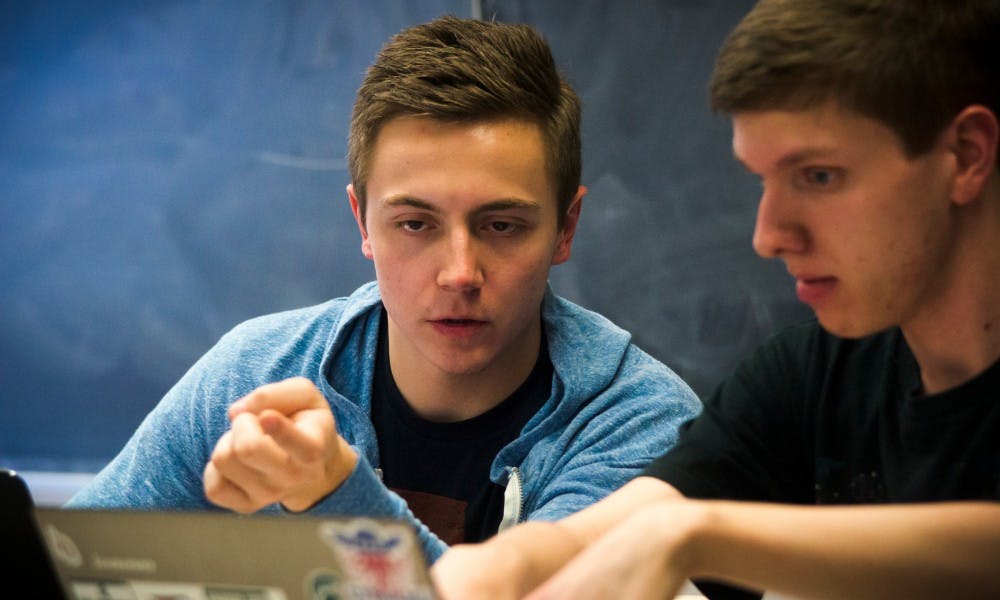Most MSU students file into Wells Hall during the week for their recitations, lectures or to wait in the Starbucks line.
Most, however, don’t come on a Saturday at 8:30 a.m. and stay there until 10 p.m.

Most MSU students file into Wells Hall during the week for their recitations, lectures or to wait in the Starbucks line.
Most, however, don’t come on a Saturday at 8:30 a.m. and stay there until 10 p.m.
But that's exactly what the MSU Debate team did when they held the District 5 qualifier from Feb. 17-18, competing against debate teams from University of Michigan, Wayne State University, Indiana University and Northwestern University to qualify for the National Debate Tournament.
MSU Debate had four competitors in the qualifiers — business sophomore Christian Rodriguez, social relations and policy sophomore Luc Walkington, James Madison College sophomore Lena Grossman and physics sophomore Evan Runburg — who all qualified for the National Debate Tournament at University of Kansas from March 23-27.
This is the Spartans 21st consecutive year qualifying for the debate tournament.
Head coach William Repko said he takes the four best debaters who performed the best during the season to participate in the District 5 Qualifiers.
However, Repko said after the loss of graduating seniors, he wasn’t sure what this season would bring.
“We were concerned that we would be purely in rebuilding mode,” Repko said. “But we’re optimistic we’ll qualify again for the main tournament.”
To qualify, hours of research is put into this season's nationwide topic of environmental issues.
“As the season progresses, you find out how the other schools in the Big Ten are approaching the topic,” Repko said. “What arguments is Michigan making about climate change, what arguments are Indiana making about the ozone layer?”
This preparation is partially why Runburg is drawn to being a debater, even though he “accidentally” got involved his freshman year of high school.
“For every season, we do thousands of pages of research under every topic potentially connected to the resolution that we have,” Runburg said. “We have to have an in-depth knowledge ... to be able to succeed at a high level, because our opponents will exploit any gaps in our knowledge.”
Rodriguez said this amount of research that goes into a topic has kept him involved with debate.
“I really like the academic nature of it,” Rodriguez said.
Runburg said he also has stayed involved with debating because of the “unique intellectual atmosphere.”
“It’s all about your knowledge of policies and your ability to explain that and striving to beat other people, not with (President Donald) Trump style bravado, but through sheer force of argumentation,” Runburg said. “It’s something you don’t find anywhere else.”
How to explain topics is a different beast.
Runburg said a lot of practice goes into performing the arguments, especially in the very limited time they have to deliver their speeches.
“Speaking quickly, refining argumentations so that we're able be the most efficient and effective,” Runburg said. “It isn’t something that comes naturally to most people, so we have a lot of practice speeches with the coaches.”
Rodriguez said it took him about two years to be able to deliver his argument in fast and effective fashion.
Support student media! Please consider donating to The State News and help fund the future of journalism.
“It’s really honestly just doing speaking drills, just like 30 minutes every day,” Rodriguez said.
Repko said as a coach, preparation and the actual performance is similar to that of a lawyer.
“It’s kind of how you do with your stage fright,” Repko said. “The best prepared lawyer that struggles in front of the jury with their delivery will often run into trouble.”